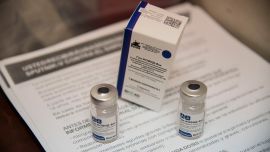Russia's Sputnik V vaccine is 91.6 percent effective against symptomatic Covid-19, according to an analysis published in The Lancet on Tuesday that independent experts said allayed transparency concerns over the jab, which Moscow is already rolling out.
Sputnik V – named after the Soviet-era satellite – was approved in Russia months before results from its final-stage clinical trials were published, leading to scepticism from experts. But the new analysis of data from 20,000 participants in Phase III trials suggests that the two-dose vaccination offers more than 90 percent efficacy against symptomatic Covid-19.
The preliminary findings show that the two-dose Sputnik V "has shown high efficacy" and was well tolerated for participants over 18 in final-stage clinical trials, said co-lead author Inna Dolzhikova of Russia's Gamaleya National Research Centre for Epidemiology and Microbiology.
The findings are based on an analysis of data from more than 20,000 participants, three-quarters of whom received the vaccine, with one-quarter given a placebo.
So-called "serious adverse events" – i.e. those requiring treatment in hospital – were "rare," with none associated with vaccination.
Four deaths were reported, none of which were related to the vaccine. Most who took the vaccine reported mild adverse events, including "flu-like symptoms, pain at injection site and weakness or low energy."
"The trial results show a consistent strong protective effect across all participant age groups," concluded the journal.
"The development of the Sputnik V vaccine has been criticised for unseemly haste, corner cutting, and an absence of transparency. But the outcome reported here is clear and the scientific principle of vaccination is demonstrated, which means another vaccine can now join the fight to reduce the incidence of Covid-19," said an independent Lancet commentary by Ian Jones of the University of Reading and Polly Roy of the London School of Hygiene and Tropical Medicine.
"But the outcome reported here is clear and the scientific principle of vaccination is demonstrated, which means another vaccine can now join the fight to reduce the incidence of Covid-19," it continued.
'Global response'
The trial involved giving 14,964 participants in the vaccine group and 4,902 in the placebo group two jabs 21 days apart.
Those taking part were tested for Covid-19 at enrolment into the trial, again when they had the second dose and then after that if they reported symptoms.
From the second dose, 16 cases of symptomatic Covid-19 were confirmed in the vaccine group and 62 cases were reported in the placebo group, giving an efficacy equivalent to 91.6 percent.
The authors said, however, that efficacy was only calculated on symptomatic cases and said more research would be needed to assess how it affects asymptomatic disease.
They added that the follow-up period was around 48 days from the first dose, so the full period of protection is still unknown. The trial is ongoing and plans to recruit a total of 40,000 people.
Sputnik V uses two different disarmed strains of the adenovirus, a virus that causes the common cold, as vectors to deliver the vaccine dose.
Developers said that using a different adenovirus vector for the booster vaccination minimises the risk of the immune system developing resistance to the initial vector, so it may help create a more powerful response.
Alexander Edwards, an Associate Professor in Biomedical Technology at the University of Reading, said the trial might help provide evidence to this theory of immune response.
"Pandemic means 'all' – and the only way to address a global problem is with a global response – sharing data, science, technology and medicines," he said.
The vaccine has the advantage of being able to be stored at normal refrigerator temperatures instead of the conditions far below freezing required for some other vaccines.
Top-performing vaccines
The results suggest Sputnik V is among the top performing vaccines, along with the Pfizer/BioNTech and Moderna jabs that also reported more than 90 percent efficacy.
Pre-empting the results of the phase III trials, Russia has already launched a mass inoculation campaign for citizens 18 and older.
Several countries around the world have already registered Sputnik V, according to the Russian Direct Investment Fund which helped develop the vaccine, including Belarus, Venezuela, Bolivia and Algeria.
In January, Chancellor Angela Merkel said Germany had offered Russia support in Moscow's development of Sputnik V, after Russian authorities said they had applied for registration in the European Union.
Argentina began its nationwide vaccination campaign, which is voluntary, on December 29, using Sputnik V.
To date, Argentina has received three shipments of the two-shot vaccine, receiving some 820,000 doses of the 19.4 million that Russia has promised to provide by the end of the month.
Doubts are growing as to whether that figure will be met, given that the government had initially expected to receive five million by the end of January.
Argentina's newly designated ambassador to Russia, Eduardo Zuain, said Monday that the government would seek an agreement with Russia that would enable it to "eventually" manufacture the Sputnik V vaccine in Argentina.
– TIMES/AFP


























Comments